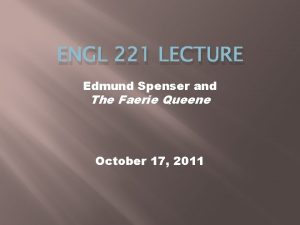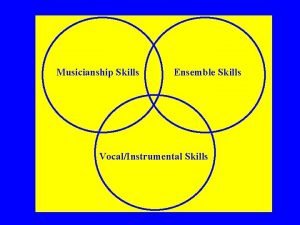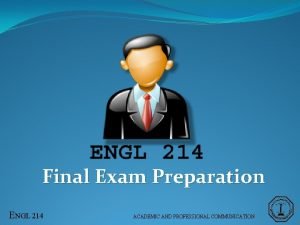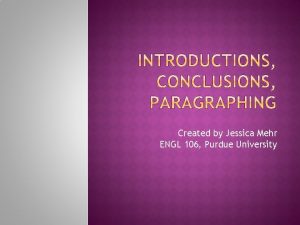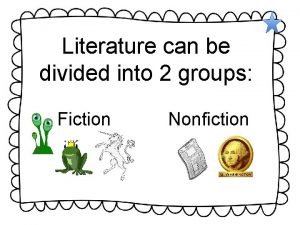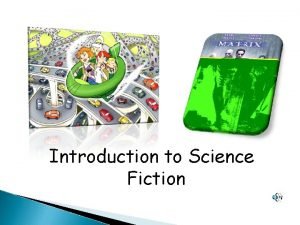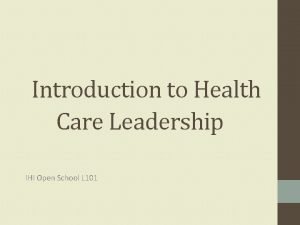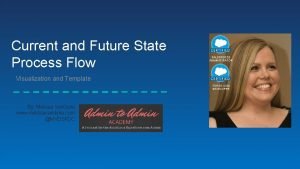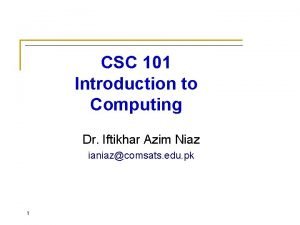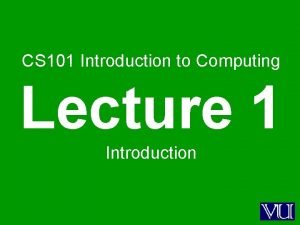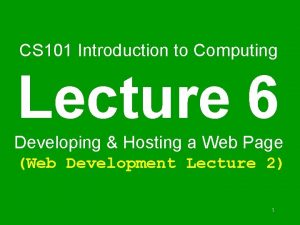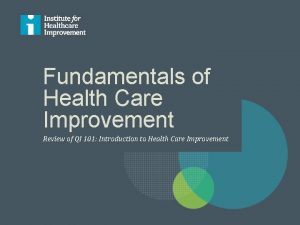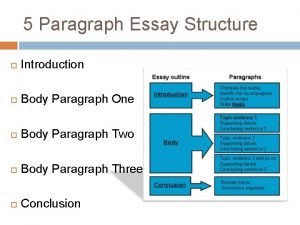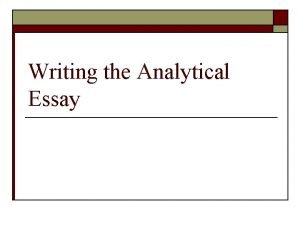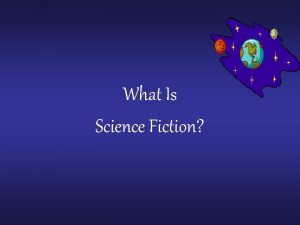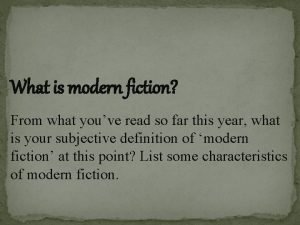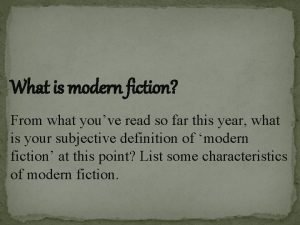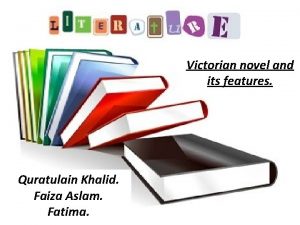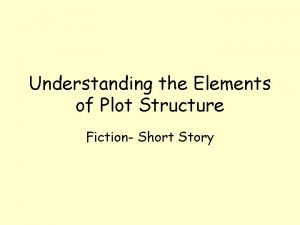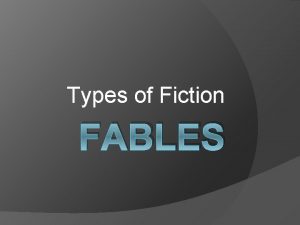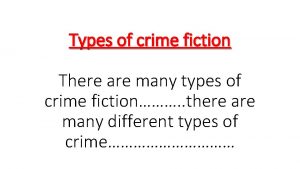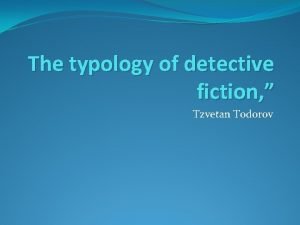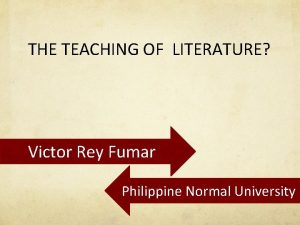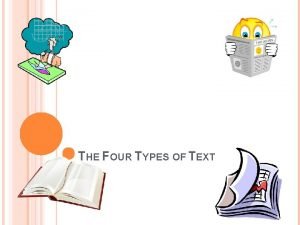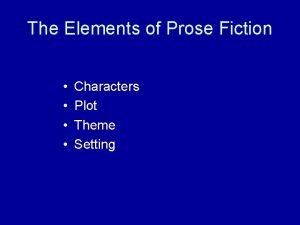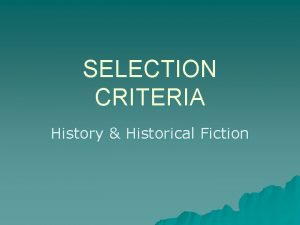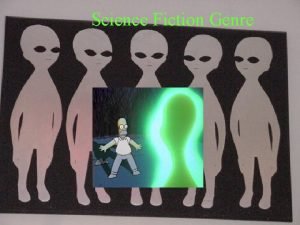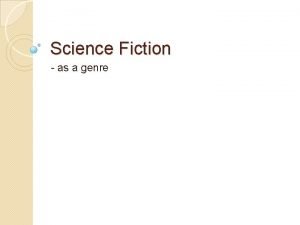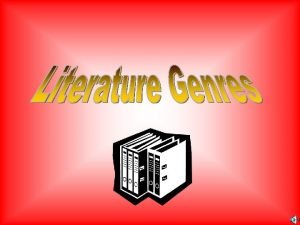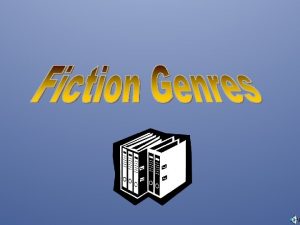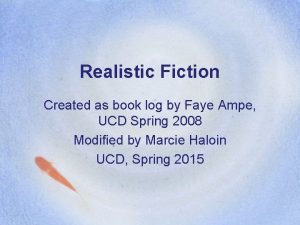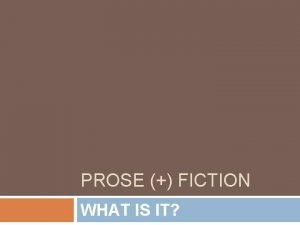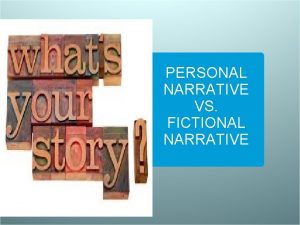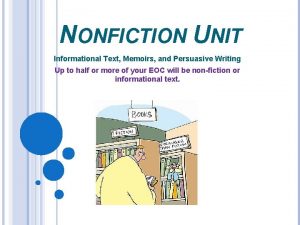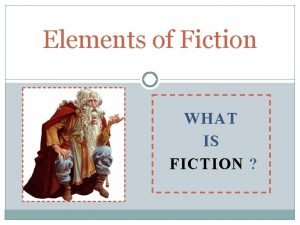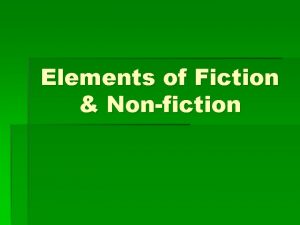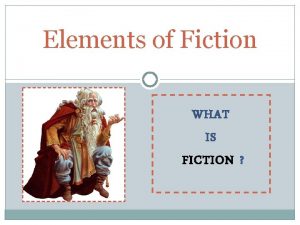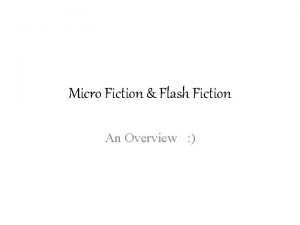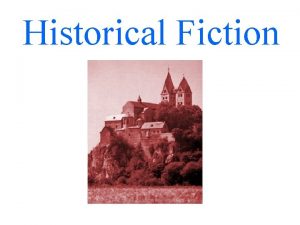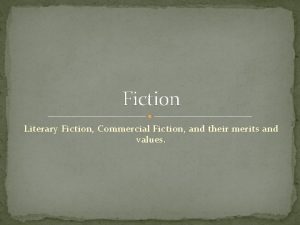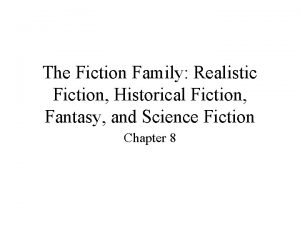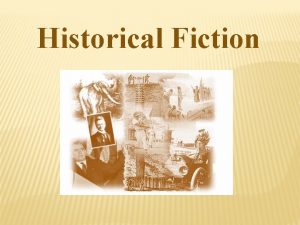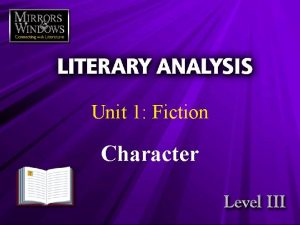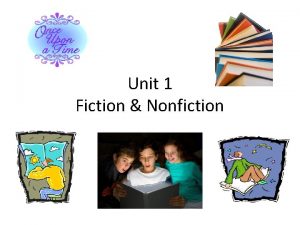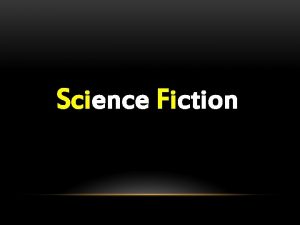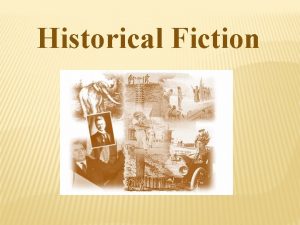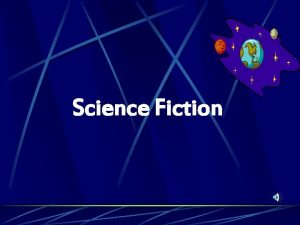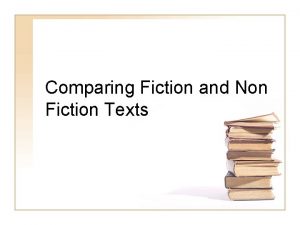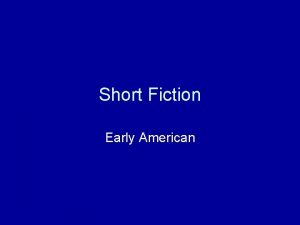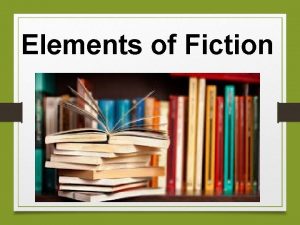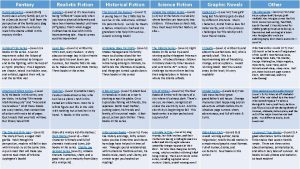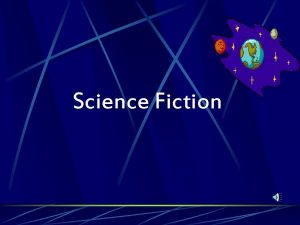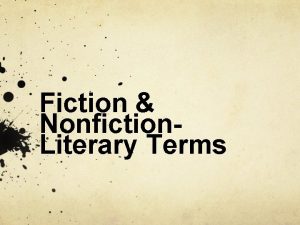Welcome to ENGL 101 W Introduction to Fiction







































- Slides: 39

Welcome to ENGL 101 W: Introduction to Fiction Professor Poyner-Del Vento

Kindly turn off �All cell phones �The wireless component of any laptop computers

Overview of lecture �Introduction to instructors and course �Syllabus �Plagiarism �Mediation of war �“The Fictionalization of War”

Introduction to instructors and course

Professor �Professor Poyner-Del Vento �“Professor P. D. ” �Responsible for the content of this course �Responsible for setting assignments �Responsible for giving weekly two-hour lectures

Tutorial Leaders (T. A. s) �Kyle Carpenter �Wendy Thompson �Responsible for conducting weekly one-hour tutorials �Responsible for grading

Course Aim �This course’s theme is “The Fictionalization of War. ” This course is structured chronologically: our readings start with the U. S. Civil War, move through the two World Wars, and end with the Vietnam War. With this structure, we will explore the characteristics and contradictions of historical fiction. We will also focus on the purpose, as well as the difficulties, of fiction that portrays war for a primarily civilian readership.

Canada is at war �Canadian troops are part of the U. S. -led war in Afghanistan �Canada’s involvement: �Since 2001 �Estimated to cost $18. 1 billion �More than 13, 500 Canadian soldiers have served (as of 2008) � 155 Canadian soldiers killed Summarized from CBC: http: //www. cbc. ca/news/canada/story/2009/02/10/f-afghanistan. html http: //www. cbc. ca/news/background/afghanistan/bythenumbers. html http: //www. cbc. ca/news/background/afghanistan/casualties/list. html

What do you know about the war in Afghanistan? �Stick to facts—don’t share your opinion �Write for several minutes �If you have time, include where you received this information (e. g. , the Internet, the news, your friends)

How do you feel about the war in Afghanistan? �Share your feelings, opinions, and emotions �Use any format: �Paragraph �Poem �Drawing

Your thoughts and feelings

Syllabus �Less grim than discussing the war in Afghanistan �A syllabus is a contract

Plagiarism

Contradictions in Academic Writing �“Develop a topic based on what has already been said and written but write something new and original �“Rely on opinions of experts and authorities on a topic but improve upon and/or disagree with those same opinions �“Give credit to researchers who have come before you but make your own significant contribution �“Improve your English or fit into a discourse community by building upon what you hear and read but use your own words and your own voice” quoted from OWL Website: http: //owl. english. purdue. edu/owl/resource/589/01/

Graphic from OWL website: http: //owl. english. purdue. edu/handouts/research/r_plagiar. html

Should you cite? Need to Cite Don’t Need to Cite

Should you cite? �Information from a newspaper, book, or website �Information from an e-mail �Generally accepted facts �Reprinted illustrations or photographs �Your own memories or opinions �Ideas from conversations with classmates �Unique phrases �Common knowledge �Results from your own experiment

Patchwriting �Most common type of plagiarism in ENGL 101 W �According to the SFU Plagiarism Tutorial: “Patchwriting occurs when a student paraphrases a passage but leaves it too similar to the original. In patchwriting, the writer may delete a few words, change the order, substitute synonyms and even change the grammatical structure, but the reliance on the original text is still visible when the two are compared. ” �http: //www. lib. sfu. ca/node/10470/take

Patchwriting �Most common type of plagiarism in ENGL 101 W �According to the SFU Plagiarism Tutorial: “Patchwriting occurs when a student paraphrases a passage but leaves it too similar to the original. In patchwriting, the writer may delete a few words, change the order, substitute synonyms and even change the grammatical structure, but the reliance on the original text is still visible when the two are compared. ” �http: //www. lib. sfu. ca/node/10470/take

Collusion �A particular type of plagiarism �Unauthorized/inappropriate help on a take-home assignment

Is this help appropriate? �Appropriate in virtually all SFU courses �Help from your professor, T. A. , or T. M. given during office hours �Research help from a librarian �Appropriate in ENGL 101 (with an Acknowledgements Page) �Proofreading from a friend or tutor �Not appropriate in ENGL 101 �Radical rewrites from anyone but you

Is this help appropriate? �Original: “Cold Mountain is set during the US Civil War, it’s protagonist is a a deserter from the Confederate Army. ” �Appropriate editing help: “Cold Mountain is set during the U. S. Civil War; its protagonist is a deserter from the Confederate Army. ” �Inappropriate editing help: “Charles Frazier’s historical novel Cold Mountain creates a Confederate hero that is accessible to modern readers; as a deserter, Inman’s distrust in the South makes him more relatable. ”

Plagiarism has large consequences �Any plagiarism, even accidental, will result in an automatic zero and will be reported to the Academic Integrity Office �No make-ups �Always follow a policy of CYA �More information is available on ENGL 101’s Web. CT page in the folder “Resources on Avoiding Plagiarism”

Mediation of War

What are we looking at? Image from Art in the Picture: http: //www. artinthepicture. com/paintings/Rene_Magritte/This-Is-Not-A-Pipe/

The war in media �Most of us have experienced the war in Afghanistan through various forms of media

Medium �According to The Concise Oxford Dictionary of Literary Terms, medium means “the material or the technical process in an art or a communication. In literature, the medium is language. . . A misleading implication in some uses of the term is that the meaning of a work already exists as a complete entity only requiring transmission through the medium of language; this notion is resisted by most modern theorists of literature. ” quoted from The Concise Oxford Dictionary of Literary Terms by Chris Baldick, page 131

Mediated experiences of the war in Afghanistan �Have you read an article about the war in Afghanistan (in a newspaper, magazine, or online)? �Have you seen a photograph of the war in Afghanistan? �Have seen a news video of the war in Afghanistan? �Have you seen a movie about the war in Afghanistan? �Have you heard an interview with a soldier or a civilian from the war in Afghanistan? �Have you spoken to a soldier who has served in the war in Afghanistan or a civilian from the war in Afghanistan?

This is not the war in Afghanistan Image from CBC: http: //www. cbc. ca/news/canada/story/2009/02/10/f-afghanistan. html

This is not the war in Afghanistan Image from CBC: http: //www. cbc. ca/news/world/story/2008/08/20/f-afghan-analyze. html

These are not the war in Afghanistan �Photos �Video �Audio interviews �Newspaper articles �Essays �Stories �Poems �Plays �Movies �Conversations

Direct experiences of the war in Afghanistan �Has anyone in this class directly experienced the war in Afghanistan? (e. g. , as a soldier, a civilian, a journalist, etc. )

“The Fictionalization of War”

Course Aim �This course’s theme is “The Fictionalization of War. ” This course is structured chronologically: our readings start with the U. S. Civil War, move through the two World Wars, and end with the Vietnam War. With this structure, we will explore the characteristics and contradictions of historical fiction. We will also focus on the purpose, as well as the difficulties, of fiction that portrays war for a primarily civilian readership.

Four novels about four wars �Cold Mountain—U. S. Civil War �The Ghost Road—World War One �The English Patient—World War Two �The Things They Carried—Vietnam War

ENGL 101 W will focus on �Contemporary fiction �Portrayals of soldiers’ experiences �Western perspectives �Mainly male perspectives

Professor P. D. ’s particular interest �Disconnect between soldiers’ and civilians’ experiences �The role of fiction in mediating civilians’ experiences of war

Experiences of a soldier/student �Audio interview by the New York Times with a veteran of the Iraq War who is now a student at an Ivy League university �Explores his difficulty transitioning from war to civilian life �http: //www. nytimes. com/interactive/2010/01/09/nyre gion/veteran-columbia/index. html

Cold Mountain Read up to page 146 by next lecture
 Edmund engl
Edmund engl Engl 5440u class notes
Engl 5440u class notes Professional communication final exam
Professional communication final exam Sample opening statement examples
Sample opening statement examples It is genre of speculative fiction dealing with imaginative
It is genre of speculative fiction dealing with imaginative Non fiction elements
Non fiction elements Contemporary realism literature
Contemporary realism literature Fiction and non fiction examples
Fiction and non fiction examples Wise men three clever are we
Wise men three clever are we Introduction to science fiction
Introduction to science fiction Ihi l 101
Ihi l 101 Current state vs future state diagram
Current state vs future state diagram It 101 - introduction to computing
It 101 - introduction to computing Cs101 vu edu pk
Cs101 vu edu pk It 101 introduction to computing
It 101 introduction to computing Qi 101: introduction to health care improvement
Qi 101: introduction to health care improvement Welcoming prayer sample
Welcoming prayer sample Body paragraph structure
Body paragraph structure Analytical essay fiction
Analytical essay fiction Definition of science fiction genre
Definition of science fiction genre Modern fiction definition
Modern fiction definition What is modern fiction
What is modern fiction Facts about historical fiction
Facts about historical fiction The victorian novel
The victorian novel Elements of fiction plot diagram
Elements of fiction plot diagram Fables defintion
Fables defintion Types of crime fiction
Types of crime fiction Typology of detective fiction
Typology of detective fiction What is mobile phone text tula
What is mobile phone text tula Types of narrative text
Types of narrative text The elements of prose fiction
The elements of prose fiction Historical fiction defintion
Historical fiction defintion Science fiction genre characteristics
Science fiction genre characteristics Purpose of science fiction
Purpose of science fiction Fiction example
Fiction example Realistic fiction defintion
Realistic fiction defintion Heartbeat sharon creech summary
Heartbeat sharon creech summary Prose definition
Prose definition Personal narrative fiction
Personal narrative fiction Dog denotation
Dog denotation
